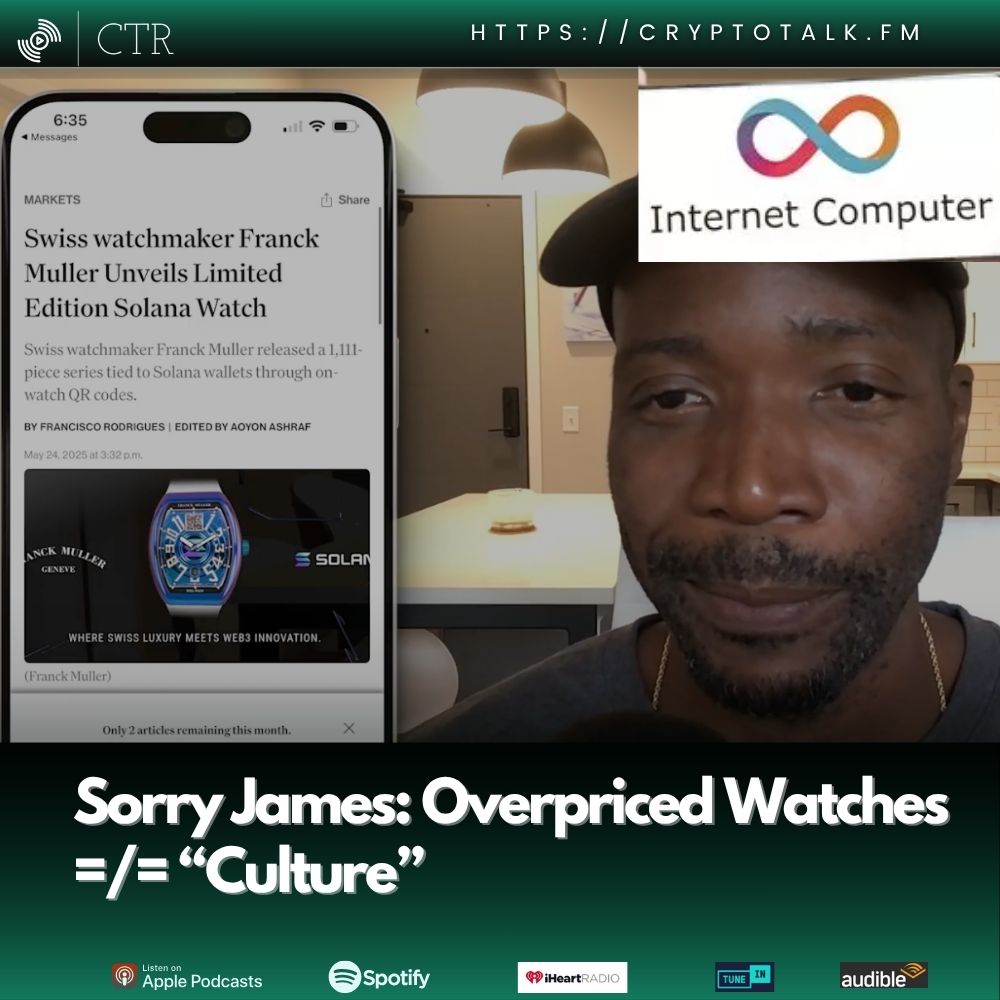[00:00:01] Welcome to Crypto Talk Radio, the podcast for everyday investors like you. Visit us on the
[email protected] and now here's your host, Leister.
[00:00:13] Thank you for that, Bailey, and welcome everybody out there and Crypto Talk radio
[email protected] we are getting dangerously close to the official start of summer as the heat is starting to turn up. After a period of weird multiple days of cold rain that's gone, the grass is green, trees are blooming and the insects are out in force usually indicates that summer is upon us.
[00:00:39] Hopefully people are not spending time outdoors in the sun without protection because that's a dangerous thing to be doing.
[00:00:47] I am going to be this will be a short episode again.
[00:00:51] It's a short episode because I don't see stare at cryptocurrency and I don't follow every single thing because most of those are just stunts to get people to buy in and FOMO off stuff. So today I'll be talking about, you know, the usuals with numbers.
[00:01:10] I'm also going to be talking about a couple of, you know, I don't think, in my opinion, I don't think enough people appreciate how much shadiness there is to cryptocurrencies use as it stands and risk.
[00:01:29] And I don't think people appreciate how things are apt look it up to shift in 2026. It is this I'm going to focus a little bit of time on. I won't spend a lot of time on it because it's a boring topic. For some, if you knew, welcome. But for those long time and again, I know some they're asking for the next, you know, something to FOMO into. And I'm not talking about those because I don't want you to FOMO into garbage. I don't want you to lose money. I want to help you learn how to look for projects that might be worth your time. It just so happens there aren't very many from my lens and we've not hit anything close to an altcoin season. So even if I wanted to, there hasn't been any opportunity for anything that you didn't already know about. Right now the best buy is Bitcoin Ethereum. I would argue Ethereum more than Bitcoin for right now, but they're both good buys. Any of the other mains can still never steer you wrong. That's why I'm going to stand on that and continue doing so. Let's talk about what we got CoinDesk.com and we are going to zoom out to the month chart starting with Bitcoin. Me thinks I looked at the month chart for Bitcoin and saw a pattern that told me that we were headed downward. And I wasn't sure if I was seeing things wrong. But the deed does seem to be headed downward.
[00:02:59] Over the past 24 hours, a low of 108,000, a high of 110, just shy of 111, currently at the 109. And this is what I mean in terms of a downward trend is that the momentum I think it got as high as like 112 recently was not sustained and could not sustain itself. And as a result we started heading back down. Similar with Ethereum. And I've said that Ethereum is usually my measure as to whether what I'm seeing is legitimate or not. Because if Ethereum does not run, usually it's a fake out. The bitcoin pricing does not mean you cannot make money off of it. But the it's a fake out. You're not going to sustain it, we're not going to get sustained money out of it.
[00:03:42] Ethereum has the same middle thing situation going on a low of 2500, a high of 2700, roughly about the 2700 now, but just shy, I would argue, of the 2700 in the downward direction.
[00:03:58] So Ethereum doesn't look like it's going to crap out.
[00:04:02] It doesn't look like we're going to get to those amazing numbers that we did before.
[00:04:07] And it doesn't have the same sharpness that Bitcoin does. Bitcoin looks like it's set for going back down possibly to the hundred thousand dollar range. That's extreme, but that's just what I see. It can be completely off and rocker. But that's what I see on the numbers and didn't know for those out there what is I would like to know, seriously. CryptoTalk FM, hit the comments. But I would like to know the thoughts about what's going on with Bitcoin specifically, but also Ethereum.
[00:04:38] It's been quite a few weeks that I've said Ethereum is not going, certainly isn't going up, but it's not crapping. It's just in the middle. You usually don't see this much middling behavior out of any cryptocurrency for this length of time.
[00:04:54] Now there's one of two outcomes that we can expect.
[00:04:58] One, an explosive run up to some sort of a crap out at some point as people kind of get tired of it.
[00:05:06] I would lean towards the explosive run up. We just don't know exactly when that's going to happen because we haven't hit a point beyond Bitcoin. And most of that, I think, is being driven by the Sailor and all these other announcements that are coming out and talked about. So I'm not suggesting that anything is specifically wrong, rather that people are just kind of following the news.
[00:05:28] And maybe that's a good thing for anybody who is on the fence about buying in, because if it's true that people are just buying off of what they read, that's fomo certainly. But it also means that bitcoin's price has no choice but to go further up. I would like to see a little bit more, I don't know, sustainability to Bitcoin's price. You know, if it's going to go to a place, I want to see it hold for a bit. And I've not yet seen this.
[00:05:56] So the other thing I want to see is a lot of these cryptocurrency orgs, I want to see that they are contributing in a more substantive way than what I'm currently seeing.
[00:06:09] Speaking of Tether, who runs the USDT, stablecoin allegedly holds $120 billion of US debt. It is this that I wanted to talk about, and I'm not going to go through the specifics of theirs because that doesn't matter. But on a past episode, I talked about debt and I explained about debt instruments and I explained that when we think about the economy and when we think about money and when we think about the value of our money, and when you think about our debt ceilings and all these things, debt and debt instruments are what run the game. The selling of debt to other entities is what runs the game.
[00:06:48] The more debt you hold, the more power you hold over those assets, essentially.
[00:06:55] So a lot of these international players hold a lot of debt. Terms of US Debt, they hold a lot of it. And that entitles them to things like interest and things like the ability to sell assets and those securities.
[00:07:09] Well, USDT holding $120 billion worth of U.S. debt is significant in of itself for two main reasons. One, it means that they are getting money from that debt. They're benefiting financially from that debt outside of their core business, that being the stablecoin. Two, it allows them to reinvest some of that recoup back into not only the business, but into other areas. It turns out they have been investing in other businesses, United States businesses as well. Now this is an interesting turn. If you Think circle who issues the USDC stablecoin. You don't hear that they're doing significant. We know they're doing some but not significant amounts of reinvestment back into the United States.
[00:07:59] However, Tether, who if you remember was under attack by the sec, it turns out that they actually have a significant stake in United United States debt and they're reinvesting back into United States businesses. So the one that the SEC left alone and Gary Gensler left alone for suspicious reasons until they did the lawsuit. But before that they left him alone.
[00:08:20] They're apparently not doing hardly anything except whining and complaining. And then you got usdt who was under attack by that same sec. And at one point way back yonder a couple years ago, I did an update where people claimed that tether was insolvent and that turned out not to be true.
[00:08:37] What they meant is that tether's assets, so we're talking how much money they bring in were lower than their liabilities. Talking about how much money that they spend out because it turns out they actually have a lot of assets that they've been accumulating over time in the form of securities and debt instruments to get to the position that they're at and then that's allowed them to reinvest back into their core business which has made them arguably stronger. Well, we don't know big picture stablecoin regulation and what that's going to take shape of. Well, what happens if the they create regulation that just completely guts their ability to hold U S debt? I don't think they will. But what if they do? These are things that we have to take into consideration when we see organizations that are not US Based holding significant U S debt instruments and them being subject to United States regulations in the long term.
[00:09:30] I want to give a quick. This is real quick because I think it's a bunch of garbage, but if you don't listen to rap, kudos to you. But if you don't listen to rap, there's a rap group called Migos.
[00:09:41] Migos, I don't listen to that garbage. But Migos, they, they were one of the first that did the. What's called the mumble rap.
[00:09:51] That garbage. They wanted the first to do that.
[00:09:54] Recently Migos's insta scam account got hacked.
[00:09:59] After it got hacked, Solana, one of the people from Solana Rajal, his account, they took information from his KYC of his account.
[00:10:10] They were trying to extort him for 40 Bitcoin. They told him that you better give us this or we're going to release your information, we're going to dox you. So it's called.
[00:10:19] But instead of doing it on their own, they hacked Migos's Insta scam account to release this Solana guys details, his photos, his personal information after he refused to give up 40 bitcoin. The other thing that happened, similar but not exact.
[00:10:37] If you know Amaranth, Amaranth is a. I'm gonna call her. I'm gonna call her what I feel like calling her. If you get offended, that's on you. I'm gonna call her what I feel like calling her. Okay?
[00:10:49] This is a girl just like Hawk to a girl who attracts simps. That's what she does. She's on the YouTube side and Twitch, more Twitch than YouTube and she does all this streaming and all this garbage while catching simps. She's a, you know, simp catcher. That's what she was.
[00:11:08] She had a break in. They broke into her house, pistol whipped her three times trying to get access to her crypto. She gave an interview where she said something to the effect. And I was, this is why I have no sympathy for this girl because first of all, her husband was in the house and he was taking a number two and they were on speakerphone talking to each other. So that gives you a sense of how big their fucking house is, right?
[00:11:33] But she said something to the effect of, okay, these people just broke into the house and started asking for the crypto. I didn't know what they were talking about as digital assets. How am I supposed to hand it over?
[00:11:45] Just no self awareness of what she's saying. She knows first of all they, how they found your ass is you're flossing your wealth on media, you're flossing your wealth on Twitch while you're showing your titties. You're flossing your wealth on YouTube or wherever else. You're flossing wealth on social media. And so they tracked your ass down. And when they tracked your ass down, they decided they were going to go after your crypto because they knew you had it. So instead. And then she said, yeah. So I had boxing training, so I knew to put my hands up and block, but I got a cut on my head. Just no self awareness to say, is it worth this? I should not have been flossing my shit on social media. I should not have been putting it out there. This would not have happened to me if I had just simply kept my stuff on my own.
[00:12:38] None of that. She's just putting it on everybody else is the problem.
[00:12:42] Here's the thing, okay? They pistol whipper three times.
[00:12:46] The other, her husband has a gun handy. Now why he goes to a number two and is still strapped, that's their business. Regardless, he comes out, apparently shoots at them and then take off running and allegedly hit one of them.
[00:13:00] So you got my point. The summary of this I said on multiple time episodes, it's like, stop flossing your wealth. Stop talking about what you do and don't have. It's nobody's business. I don't care if they're family.
[00:13:14] Stop putting your stuff out there because this is the kind of stuff that's going to happen to you and it's not worth it. It damn sure isn't worth. She could have been killed, okay? And frankly, those dudes, the fact that they didn't kill her and the fact they pistol whipped her instead of killing her tells me they're young, tells me that they were afraid going in there and they probably didn't even know she was married.
[00:13:41] And because she's flossing ass on the screen, they assume she was probably single or whatever or just had a boyfriend that didn't live there. They just made basic assumptions. So when they tracked her down and I saw the video of the security, they just walked in the front door. So they sold her stupid ass, didn't bother locking up. And, and I don't want to hear about, well, you shouldn't have to lock your doors. We're not talking about what you should or shouldn't. We're talking about what is. What is. You are putting ass up on the screen. You're flossing your wealth on the screen. You better have some kind of tight security as with Logan Paul and Jake Paul, by the way, because if you don't, this is the kind of stuff that can happen separately when you mess up, which is you put yourself in that situation, you, you need to own that. Same with this Raj dude. He put himself in that situation because he's flossing all of the information that he had out there, which put him in a situation where they were able to breach him and put his KYC out there. So it's up to you what you do. I'm telling you, if you've got any kind of cryptocurrency, I don't care how much you have, how little you have, stop telling people how much you have. That's why you never heard me say how much I have in anything. I might tell you. I just tossed a couple bucks at Project X over here.
[00:14:55] I'm certainly not telling you how much Bitcoin I have. I'm certainly not telling you a wallet address. Like these are things that should not be distributed and should not be communicated. I can tell you right now, I don't have enough cryptocurrency to make it worth somebody trying to snap off and do something. But she said that they shot the Dorian, okay? Now, if somebody shot the door, apparently, if somebody shot the door in and she still stayed upstairs, didn't do anything about it, didn't call the police, let's just say I don't believe the story. Let's just put it like that. But if somebody were to try to do that on my place, they're going to run into a problem, because the first thing they're going to run into is a cult peacemaker, you know? So I'm saying I don't put it out there because there's no reason to. It's nobody's business.
[00:15:46] If you want to do that, you. You get what's coming to you because you're stupid enough to put your stuff out there for no reason. Why are you doing that? You're doing that because you want to be looked at as better than everybody else. Those people, those kind of people don't give a damn about what you think about you being better than them. They just want what it is that you're advertising. So if you want to give them what you're advertising, that's your business.
[00:16:11] I'm going to maintain. Stop flossing your stuff out there. Stop putting it out there. It's not worth it, in my opinion.
[00:16:19] What you do is what you do.
[00:16:23] Let me close up with Bitcoin, and this will be a 101. This will not take too long.
[00:16:28] So it's, it's around an update that came out, and it has to do with this whole quantum computing and the fears that quantum computing would get to a point that it would be able to crack cryptocurrencies, inherent encryption protocols, and safety measures to where everything crashes and burns and. And fails.
[00:16:49] So this came out because Google is the one that's been pushing the whole narrative around quantum computing and what it can do and the fact that things can be calculated much faster than before. So if you think about, you know, if you work at a company and they have you log into some vpn, right, sometimes they'll ask you to have a dongle or some software that you have to put in a code, and there's encryption around everything that's happening. The thought was it's extremely difficult with modern computing technology to craft the crack, rather crap crack these technologies. It's not difficult, ironically to. It just takes time.
[00:17:28] So it's time. It's time and iterations and it takes a long years. The quantum computing narrative came around where it said, okay, now we can actually do it much faster, it's much easier, and we might actually be able to make progress that we couldn't make before.
[00:17:44] And that got people nervous as well. We thought it's going to take multiple, multiple decades and years to be able to crack Bitcoin. And turns out, no, it's actually not going to take that long at all. It'll actually be a lot easier to do it with this quantum computing business.
[00:17:59] Google came out recently and said it's actually even easier, you know, with, hey, probably 10 years and we'll have bitcoin crack.
[00:18:08] So this has raised some panic again, where people are speculating that bitcoin might need to do another split. Now, when I talk split, we obviously have Bitcoin sv, we have bitcoin cash, we have bitcoin gold. There's all these branches and forks of bitcoin over time that were based on prior attacks or prior incidents or identification of weakness in what was going on that necessitated a branch off and then the current. So, like, the current bitcoin isn't even the original bitcoin that was.
[00:18:41] It was branched off at a point. And so now we're talking about doing it again to try to avoid what we now understand are risks that we, they weren't risked before because the technology hadn't advanced that far.
[00:18:54] Well, that's got people a little nervous, like, okay, well, I own this bitcoin now. If it forks off, what exactly is going to happen? What does that mean?
[00:19:01] And I wanted to just break down how this happens and what this looks like and what this really means. Okay, so when there's a split, when they fork it off, when they're trying to avoid some situation, what they're saying is that they basically say, okay, we're going to redo the core of what the network is doing. So in this case bitcoin, we're going to redo the code to harden it. It's referred to make it tighter, make it more rigid, more robust against these kinds of attacks.
[00:19:34] So instead of something where it just takes time to crack it, but especially the same algorithm, they would use more scrambling mechanisms and things to make it more difficult even for quantum computing to crack it. Because the thought is, if we're going to be leaning on Bitcoin for the foreseeable future. There's no way we can allow it to be subject to these breaches. Thus we have to do something, get ahead of it. The only way to get ahead of it, because of the nature of what it is, would be to fork it off. So you would end up ironically with this new type of Bitcoin that is designed to be essentially more resistant to these kinds of attacks. And then the Bitcoin you currently know and currently transact would be kind of a lesser version still available.
[00:20:22] But the risk is that it might do the same thing as Ethereum Classic did when Ethereum Frank forked off, where Ethereum Classic lost all of the value compared to the newer Ethereum, even though the other Ethereum, the current main Ethereum being proof of stake, took away mining profits.
[00:20:42] So then the other risk was, well, if you do this whole new Bitcoin business, are you going to try to turn that into a proof of stake model? Will he take bitcoin in any form and turn it into a proof of stake model? You defeat and destroy all sense of decentralization left with it.
[00:21:01] So there's multiple fears, multiple fears about what this means for that we expect that this quantum, it's a real thing that is going to have real risks and real concerns to the price stability and viability of Bitcoin for what we're pushing it to in the future.
[00:21:21] The question is that nobody has an answer to is what really to do about it. I can only tell you, and there's nothing to be afraid of now, but I can only tell you that they have to do something because no matter what that quantum stuff is coming, whether it's your lifestyle or not, I can't say for sure. I am telling you it is coming. It is going to be a thing. You will have to then predict which of these is going to be the go forward.
[00:21:46] It might be, might very well be that the other what you currently transact as Bitcoin maintains its dominance simply because of the originality of it. This is the original one. This is the one that's per the vision. This is the one that we created and we accept the risks of it.
[00:22:06] And so you're saying that that quantum does not affect me directly, but it might, because if it can, if it can navigate through and just breach whatever active wallets that it sees on the blockchain, that's, you know, the wallet address is public information.
[00:22:22] So let's assume, and I'm tin foiling, let's assume that it can just simply scan every single wallet address it sees, run through an algorithm, calculate your private key addresses. And Bitcoin has some robustness against this. But I'm just tinfoiling right. Find a private key, go in, take your money and jacket. All of these are possible outcomes that they can envision would happen that they're trying to get ahead of. What's the likelihood that that happens is unknown.
[00:22:52] This new Bitcoin would have to rethink the model by which public keys and private keys and access to using cryptocurrency are envisioned versus the current model. This has happened before.
[00:23:05] The original model didn't have this concept originally of a private key and a pair and trust and signed transactions and rotating random receive addresses. It didn't have all these mechanisms, those came later. Similar type thing must happen here where something has to be envisioned to help protect the assets within the wallet addresses. We just don't know exactly what that means. And at this point today, suffice to say, and I want you to understand that quantum stuff is coming in our lifetimes. Maybe depends on old you are. But it is coming and it is strengthening my resolve as to why I tell you to diversify your portfolio and don't put everything in one basket. You might have heard YouTubers say, and Michael Saylor say, no, go all in on bitcoin.
[00:23:56] No, diversify your portfolio. This is exactly why bitcoin should be part of it, but it certainly should not be the dominant part of it. Can you imagine if somebody like da Vinci, Jeremy, I know he diversifies, but let's say he didn't. Let's say he stuck with however much bitcoin he initially had years ago and that's all he did. And then this quantum comes out and just drains him dry. He'd be a pauper. He'd be nothing. Because nobody would listen to him if he didn't have the bitcoin, if he didn't have the wealth. His wealth was in that. And if he didn't diversify, he'd be just another guy. Nobody would care.
[00:24:32] I'm stressing to you as a listener, please diversify what you invest in. Don't yolo into one thing. I don't care what the YouTubers say. Diversify. Get into multiple different things, not even just cryptocurrency. Get some fixed assets, you know, gold or rich rare metals, right? Gold, silver, platinum, palladium, whatever.
[00:24:51] Get some of those. Get bonds, get stocks, get savings accounts, get diversified. Do a bunch of different things because we have no idea what the future holds for any of this stuff. And if you're trying to be a millionaire overnight, that's not going to happen either. What you do with your cash is what you do with your cash and I can't tell you otherwise. I'm sharing my thoughts because this I believe is going to be a pivotal moment that we'll look back at and say this is where we should have course corrected. This is where we should have gone a different direction and it might create an opportunity if they do this fork, which is the current popular way to treat this if they do the fork it means a buying opportunity for one of the two and we have to see which one's going to win out. It might be. And if they go proof of stake I guarantee it's going to kill the thing. Proof of stakes. The worst thing to happen to Ethereum kill the business.
[00:25:42] Hopefully they don't do that much that would be terrible. Hopefully they leave at least that much alone but they would have to maintain the current difficulty. So I don't think it's going to necessarily benefit mining profits if they kept proof of work. I don't know.
[00:25:57] I'm stressing simple message diversify. Get multiple type of assets make sure you keep multiple type access because we just don't know what the future holds. I don't. You don't know what he does? Not even Sailor Sam.






